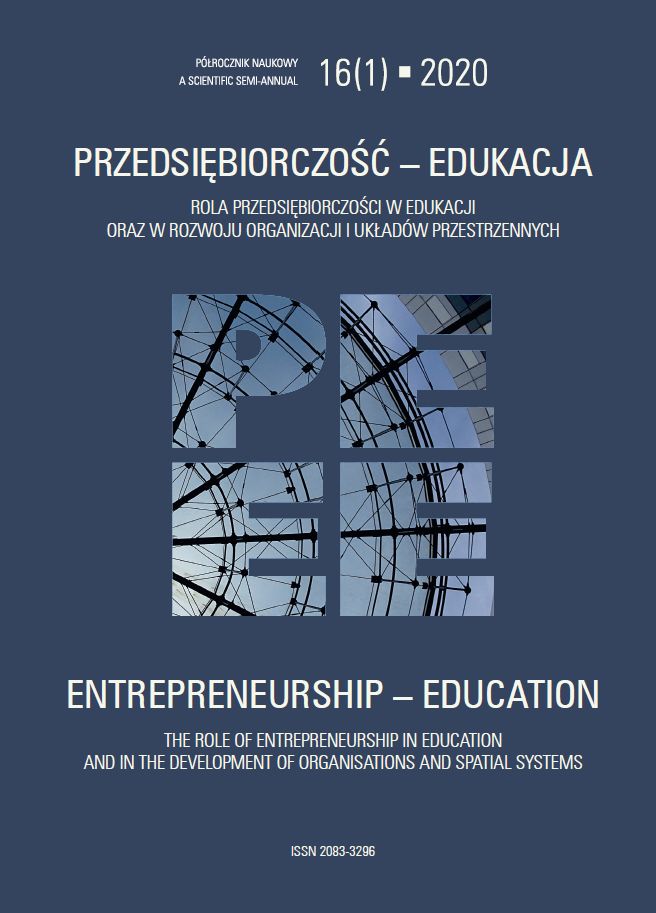Education for Entrepreneurship during Industrial Revolution 4.0: Opportunities and Challenges
DOI:
https://doi.org/10.24917/20833296.161.6Słowa kluczowe:
Economy 4.0, education, entrepreneurship, institutionsAbstrakt
Entrepreneurship 4.0 can be seen as a new type of technological entrepreneurship, based on advanced technologies (e.g. the internet of things, artificial intelligence) which should help to improve the productivity and innovativeness of the Polish economy. However, the development of Economy 4.0 is associated with certain dilemmas and even with the destruction of the existing ‘rules’ of socio-economic life. The purpose of the article is to identify the opportunities and challenges of entrepreneurship development in the context of the Fourth Industrial Revolution, regarding the role of education in this process. Thus, an explorative study was carried out based on the literature and secondary data (2015-2019) analysis (e.g. GUESS, PISA, GEM). The technical capabilities of Polish engineers and IT specialists can facilitate the development of innovative entrepreneurship 4.0. However, intensive educational efforts are required in order to improve the soft skills of the new generations (Y, Z), such as communication skills, relationship building and interdisciplinary team cooperation. Additionally, the role of education should concentrate on shaping ethical attitudes and social responsibility for the consequences of innovations introduced on the market.
Bibliografia
Białystok naszemiasto.pl. (2019, 25 października). Twórcy Photona w rankingu miesięcznika Forbes. Najzdolniejsi przed 30!. Retrieved from: https://bialystok.naszemiasto.pl/tworcy-photona-w-rankingu-miesiecznika-forbes-najzdolniejsi/ar/c3-4824077
Borowiecki, R., Dziura, M. (2016). Nowa gospodarka – aspekty wiedzy i innowacji. Przegląd Organizacji, 5, 9–16.
Bott, J., Milkau, U. (2017). Central bank money and blockchain: A payments perspective. Journal of Payments Strategy & Systems, 11(2), 145–157.
Cellary, W. (2019). Non-Technical Challenges of Industry 4.0. In: L.M. Camarinha-Matos, H. Afsarmanech,
D. Antonelli (Eds), Collaborative Networks and Digital Transformation, IFIP Advances in Information and Communication Technology, 568, 3–10. IFIP-Springer. doi: 10.1007/978-3-030-28464-0
Centralny Dom Technologii. (2019, 24 October). Retrieved from: https://cdt.pl/
Cieślik, J. (2014). Przedsiębiorczość. Polityka. Rozwój. Warszawa: Wydawnictwo Akademickie SEDNO.
Črešnar, R., Jevšenak, S. (2019). The Millennials’ Effect: How Can Their Personal Values Shape the Future Business Environment of Industry 4.0? Naše Gospodarstvo/Our Economy, 65(1), 57–65. doi: 10.2478/ngoe-2019-0005
Deloitte Global Millennial Survey (2019, 24 October). Retrieved from: https://www2.deloitte.com/global/en/pages/about-deloitte/articles/millennialsurvey.html.
Demchenko, O.P. (2017). The state regulation mechanism of cooperation between higher educational institutions and business. Scientific bulletin of Polissia, 1(9), 210–217.
Espinoza, C., Ukleja, M. (2018). Zarządzanie milenialsami. Warszawa: Wydawnictwo Naukowe PWN.
European Commission (2019a, 24 October). The Digital Economy and Society Index (DESI). Retrieved from: https://ec.europa.eu/digital-single-market/en/desi
European Commission. (2019b, 24 October). European Innovation Scoreboard. Retrieved from: https://ec.europa.eu/growth/industry/innovation/facts-figures/scoreboards_en
Gaweł, A. (2013). Proces przedsiębiorczy. Tworzenie nowych przedsiębiorstw. Warszawa: Difin.
Gibson, L.A., Sodeman, W.A. (2014). Millennials and Technology: Addressing the Communication Gap in Education and Practice. Organization Development Journal, 34(4), 63–75.
GEM. (2019, 25 października). Global Entrepreneurship Monitor. Retrieved from: https://www.gemconsortium.org/
Ibarra, D., Ganzarain, J., Igartua, J.I. (2018). Business model innovation through Industry 4.0: A review. Procedia Manufacturing, 22, 4–10.
Jaworowska, M., Piątek, Z., (2019, 24 October). Przemysł 4.0 – technologie przyszłości. Retrieved from: https://automatykab2b.pl/temat-miesiaca/47534-przemysl-4-0-technologie-przyszlosci
Kiepas, A. (2017). Ewolucja wartościowania techniki w obliczu różnych wyzwań – od zwrotu normatywnego do przemysłu 4.0. Zeszyty Naukowe Politechniki Śląskiej, Organizacja i Zarządzanie, 112, 193–205.
Kohnová, L., Papula, J., Salajová, N. (2019). Internal factors supporting business and technological transformation in the context of Industry 4.0. Business: Theory and Practice, 20, 137–145.
Kowalczyk, M. (2019). Cyfrowe państwo. Uwarunkowania i perspektywy. Warszawa: Wydawnictwo Naukowe PWN.
Kurczewska, A. (2013). Przedsiębiorczość (jako proces współoddziaływania sposobności i intencji przedsiębiorczych). Warszawa: Polskie Wydawnictwo Ekonomiczne.
Lewandowska, A., Chrostowska-Siwek, I., Tylczyński, Ł. (2017). Global University Entrepreneurial Spirit. Students’ Survey 16’. Poland. Retrieved from: http://www.guesssurvey.org/resources/nat_2016/GUESSS_Report_2016_Poland.pdf
Liao, Y., Deschamps, F., de Freitas Rocha Loures, E., Pierin, Ramos, L.F. (2017). Past, present and future of Industry 4.0 – a systematic literature review and research agenda proposal. International Journal of Production Research, 55(12), 3609–3629. Retrieved from: http://dx.doi.org/10.1080/00207543.2017.1308576
Nosalska, K., Gracel, J. (2019). Kompetencje pracowników a kształtowanie dojrzałości cyfrowej przedsiębiorstw w kontekście Przemysłu 4.0. Zarządzanie Zasobami Ludzkimi, 3–4(128), 73–86.
Photon. (2019, 25 October). Retrieved from: https://photonrobot.com/pl
Piecuch, T. (2010). Przedsiębiorczość. Podstawy teoretyczne. Warszawa: Wydawnictwo C.H. Beck.
Piróg, D. (2015). Kompetencje z zakresu przedsiębiorczości: rozważania teoretyczne i ich ilustracje w obszarze szkolnictwa wyższego. Przedsiębiorczość – Edukacja [Entrepreneurship – Education], 11, 364–376.
PISA. (2015). Program Międzynarodowej Oceny Umiejętności Uczniów. Retrieved from: http://www.ibe.edu.pl/pl/projekty-miedzynarodowe/pisa
Rachwał, T. (2019). Przedsiębiorczość jako kompetencja kluczowa w systemie edukacji. W: T. Rachwał (red.), Kształtowanie kompetencji przedsiębiorczych. Warszawa: Wydawnictwo FRSE, 16–34.
Smart Industry Polska. (2019). Inżynierowie w dobie czwartej rewolucji przemysłowej. Raport z badań. Warszawa: Ministerstwo Przedsiębiorczości i Technologii/Siemens. Retrieved from: https://publikacje.siemens-info.com/pdf/594/Raport%20Smart%20Industry%20Polska%202019.pdf
World Economic Forum. (2018). Creative Disruption: The impact of emerging technologies on the creative economy, White Paper in collaboration with McKinsey & Company. Retrieved from: http://www3.weforum.org/docs/39655_CREATIVE-DISRUPTION.pdf
Zioło, Z. (2008). Ekonomiczne i społeczne uwarunkowania rozwoju gospodarki opartej na wiedzy.Przedsiębiorczość – Edukacja [Entrepreneurship – Education], 4, 12–23.
Zioło, Z., Rachwał, T. (red.). (2009). Rola przedsiębiorczości w kształtowaniu społeczeństwa informacyjnego. Przedsiębiorczość – Edukacja [Entrepreneurship – Education], 5.
Pobrania
Opublikowane
Jak cytować
Numer
Dział
Licencja
Artykuły publikowane są zgodnie z warunkami licencji Creative Commons (CC BY-ND 4.0; uznanie autorstwa-bez utworów zależnych).

